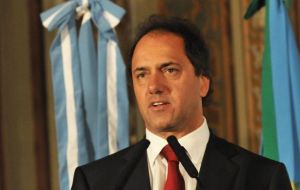MercoPress. South Atlantic News Agency
For The Economist, Kirchner’s death represents “The end of an era”
 Buenos Aires province governor Daniel Scioli, “the man to watch”
Buenos Aires province governor Daniel Scioli, “the man to watch” With the passing of former Argentine president Nestor Kirchner, The Economist forecasts “the end of an era”. The president Cristina Fernandez de Kirchner is widowed, politically as well as personally, so what happens now, asks The Economist.
“Twice this year, the second time less than seven weeks ago, Néstor Kirchner had been rushed to hospital for surgery to clear blocked arteries. His doctors urged him to rest. Instead he continued a relentless round of political activity aimed at ensuring he would succeed his wife, Cristina Fernández, in the presidency at an election due in a year’s time, just as she had succeeded him in 2007. As it turned out, one of the few things in Argentina Mr Kirchner could not hope to control was his own health. On October 27th, during a meeting at his country home in El Calafate, a resort in the Patagonian province of Santa Cruz, he collapsed and died shortly afterwards of a heart attack.
Mr Kirchner’s arrival in the presidency in 2003, after a stint as governor of Santa Cruz during the 1990s, was a product of the political turmoil unleashed by Argentina’s economic collapse of 2001-02, when five presidents came and went in days amid an $80 billion debt default and a traumatic devaluation. Eventually Eduardo Duhalde, a seasoned boss from the dominant Peronist movement, brought stability and called an election. He reluctantly backed Mr Kirchner only after several more senior leaders had declined to run.
Having been deprived of a proper mandate when his opponent, Carlos Menem, withdrew from a run-off election, Mr Kirchner began cautiously. He kept Mr Duhalde’s capable economy minister, Roberto Lavagna, and reformed the Supreme Court, appointing respected figures instead of cronies. With the economy roaring, helped by Mr Lavagna’s policies and the rise in the world price of Argentina’s farm exports, Mr Kirchner felt strong enough to turn on Mr Duhalde. He humiliated him in a legislative election in 2005, dumped Mr Lavagna and revealed himself as ruthless in accumulating power.
He reorganized the tax system to make provincial governors more dependent on the presidency, had frequent recourse to rule by decree, and nationalized some businesses. Many more he harassed into accepting price freezes, while other, favored, companies prospered. He ruled through a tight-knit group of aides. With power went personal wealth, its source never fully explained.
In 2007 he stepped aside in favor of Ms Fernández. She seemed to offer a more consensual approach. But power remained with Mr Kirchner. He took formal charge of the ruling Peronist movement, routinely gave orders to ministers and oversaw economic policy. Around Buenos Aires posters went up preparing the way for his return in next year’s election, “to deepen the model”.
Ms Fernández is not just a figurehead. She was a senator for many years. But Mr Kirchner’s death leaves her bereft not just of her lifelong partner but of her chief political adviser. She will receive much public sympathy. How she will react to her bereavement is uncertain. Some political analysts in Buenos Aires believe she may seek to build bridges to the opposition, which deprived the Kirchners of their majority in Congress in an election last year. Others suggest that she may retreat to an inner circle in which Hugo Moyano, a thuggish union leader, is an increasingly prominent figure.
In any event power is likely to start slipping away from her. Argentina has a long tradition of caudillos (political bosses). Peronism, named after Juan Perón, the country’s archetypal caudillo of the 20th century, is an amorphous, corporatist movement that has swung both right (in the 1970s and under Mr Menem in the 1990s) and left (under the Kirchners) according to its leader of the day.
The man to watch now is Daniel Scioli, the governor of Buenos Aires province, home to 40% of the electorate. A minister in Mr Duhalde’s government, he switched his loyalty to Mr Kirchner, becoming his vice-president and then his deputy within the Peronist movement. He was already showing signs of breaking with Mr Kirchner and of running himself next year. He has received overtures from a group of dissident Peronists around Mr Duhalde, who became Mr Kirchner’s most powerful foe.
Mr Kirchner set great store by defying the IMF, which he blamed for the 2001 collapse. His boycott of the Fund made it expensive for Argentina to roll over its remaining debt. Instead, to raise funds, the government nationalized the pension system and siphoned off some of the Central Bank’s reserves.
The economy is now growing fast, but inflation is high and the foundations are fragile. Ms Fernández, or her successor, is likely to lead Argentina back to more normal relations with the outside world. With Mr Kirchner’s death, the political era engendered by the chastening collapse of 2001 is drawing to a close.




Top Comments
Disclaimer & comment rules-

-

-

Read all commentsYes the econimist is right,, it´s the end of an era, the next era is kirchnerism; cfk will be the next president with 55%.
Oct 30th, 2010 - 07:39 pm 0Ms Fernández, or her successor, is likely to lead Argentina back to more normal relations with the outside world......
Oct 30th, 2010 - 10:17 pm 0Then I hope that Argentina recognises the Falklands as British, and then gets on with building a future with Argentina setting new standards,
Politics - a game similar to ping-pong .... but with more 'pong' :-)
Oct 31st, 2010 - 02:26 am 0Commenting for this story is now closed.
If you have a Facebook account, become a fan and comment on our Facebook Page!